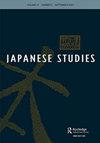Dialogic Positioning on Pro-Whaling Stance: A Case Study of Reported Speech in Japanese Whaling News
IF 0.4
Q3 AREA STUDIES
引用次数: 0
Abstract
ABSTRACT Hard news is often assumed to be ‘objective’ and ‘factual’, with little or no trace of a ‘subjective’ authorial point of view. However, what is often forgotten is that journalists still choose what information to divulge, and how to communicate that information. This article explores how whaling news is presented in Japanese hard news reports, examining the types of ‘voices’ quoted and how these voices are presented. Analysing 176 quotations from 33 news articles published between 2014 and 2018 on news relating to controversies over Japan’s whaling policy in relation to the International Whaling Commission’s 2014 ban on whaling, this article found that in most cases, pro-whaling voices (43%) are quoted far more frequently than anti-whaling voices (24%). However, in news reports on Japan’s resumption of whaling in 2015, pro-whaling voices became completely absent, because the Japanese journalists chose to quote foreign external voices that reject a pro-whaling point of view. Japanese journalists also incorporated emotional statements from local residents and fishermen in order to dramatise the issue and seek sympathy for those whose livelihood was threatened by the whaling ban.亲捕鲸立场的对话定位:以日本捕鲸新闻报道言语为例
硬新闻通常被认为是“客观的”和“事实的”,很少或根本没有作者的“主观的”观点。然而,人们经常忘记的是,记者仍然选择泄露什么信息,以及如何传达这些信息。本文探讨了捕鲸新闻是如何在日本硬新闻报道中呈现的,研究了引用的“声音”的类型以及这些声音是如何呈现的。本文分析了2014年至2018年间发表的33篇新闻文章中的176句话,这些文章涉及日本捕鲸政策与国际捕鲸委员会2014年捕鲸禁令之间的争议,发现在大多数情况下,支持捕鲸的声音(43%)被引用的频率远高于反捕鲸的声音。然而,在2015年关于日本恢复捕鲸的新闻报道中,支持捕鲸的声音完全消失了,因为日本记者选择引用拒绝支持捕鲸观点的外国外部声音。日本记者还引用了当地居民和渔民的情绪化言论,以将这一问题戏剧化,并为那些生计受到捕鲸禁令威胁的人寻求同情。
本文章由计算机程序翻译,如有差异,请以英文原文为准。
求助全文
约1分钟内获得全文
求助全文

 求助内容:
求助内容: 应助结果提醒方式:
应助结果提醒方式:


